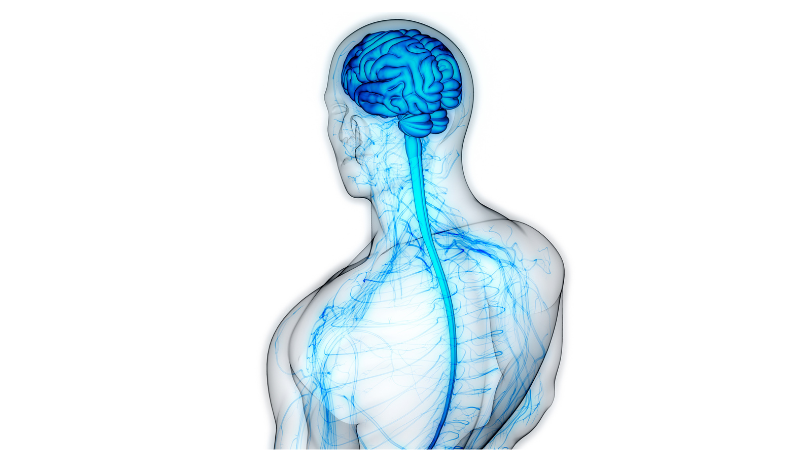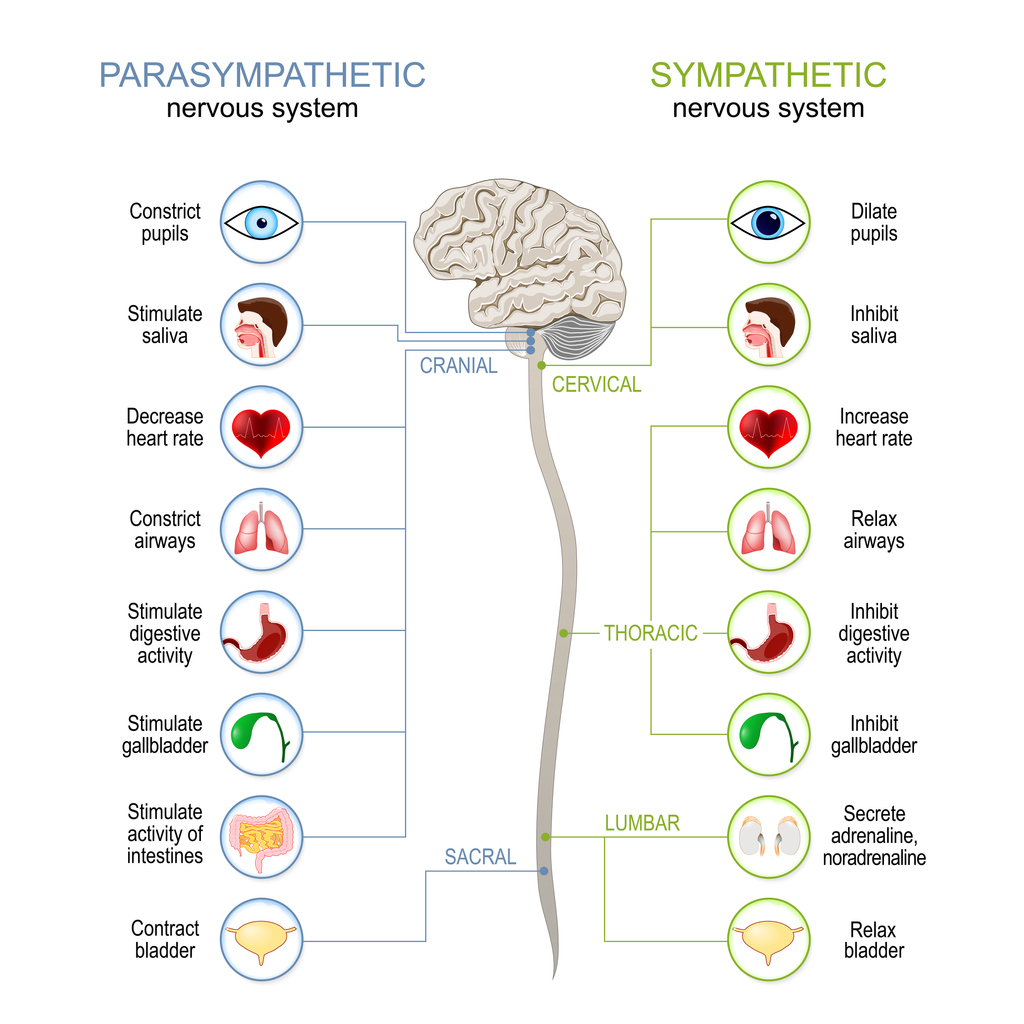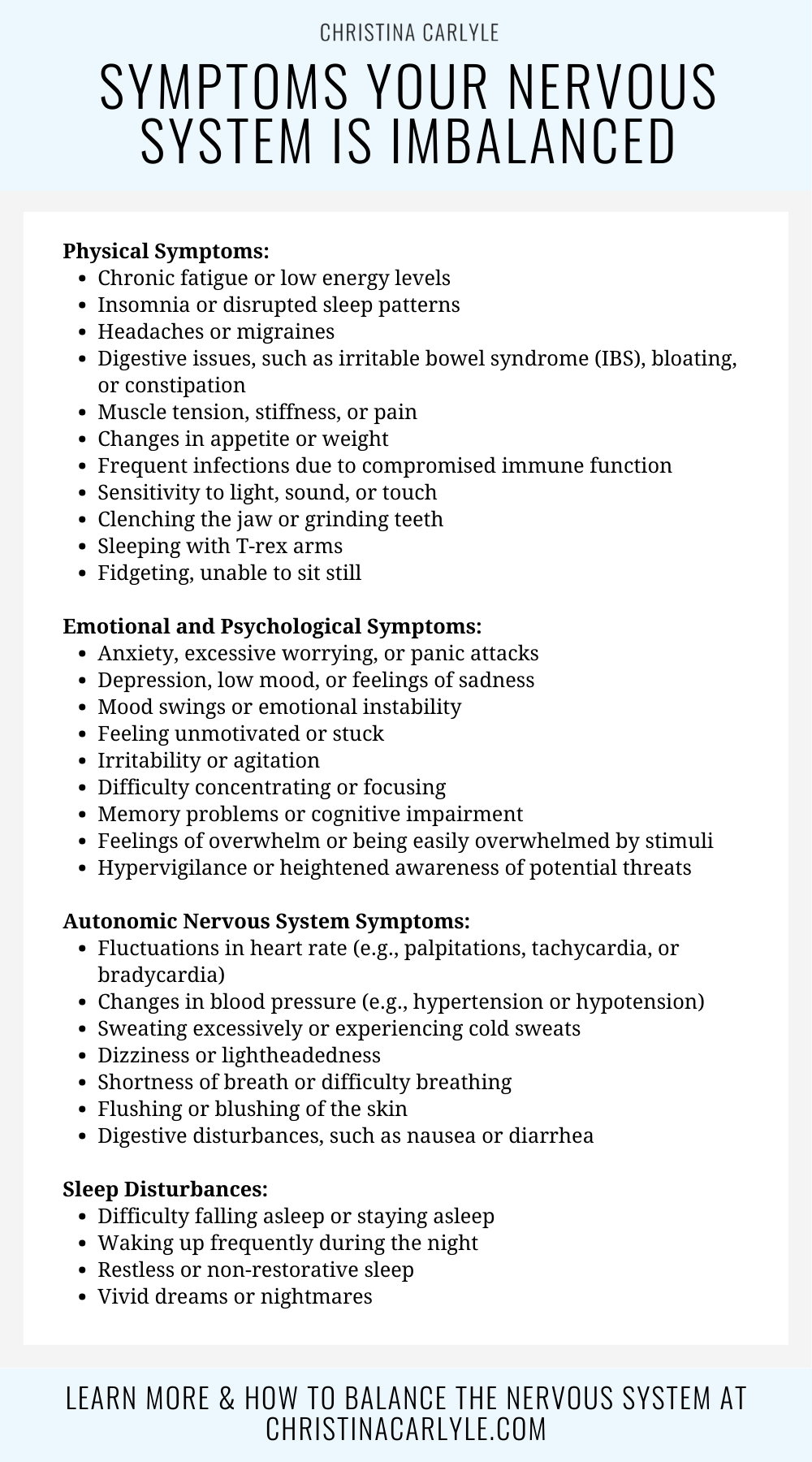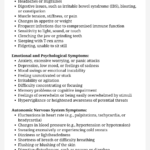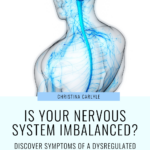Last Updated on February 29, 2024
Do you have any symptoms of a dysregulated central nervous system? I’m willing to bet you do… especially if you have any physical or mental health issues or stubborn fat.
100% of my one-on-one clients have nervous system symptoms. The problem? You can’t heal, be healthy (physically or mentally), or lose weight effectively with a dysregulated nervous system. An imbalanced central nervous system pumps cortisol and adrenaline into the body, which breaks the body down and is a root cause of all hormone, gut, and inflammatory issues. It’s also a root cause of all mental and physical health symptoms.
I have an extensive history of childhood trauma that dysregulated my nervous system. About 7 years ago I started having full-blown panic attacks out of nowhere that kept me in a state of nervous system dysregulation. It was NOT fun and it also started causing a ton of other physical and mental health issues.
All of the doctors I saw didn’t help me… they just wanted to pump me full of pills but I didn’t want to be a Xanax zombie. I wanted answers. I wanted to know why this was happening and how to stop it quickly and naturally… because that’s how I roll. (Medications cause metabolic dysfunction and other issues…)
So I spent the last 7+ years studying the nervous system and modalities that help heal it so that it gets balanced and stays balanced. I know what works and what doesn’t.
That’s why I’m doing a deep dive into the nervous system so you know what to look out for and have solutions to get your nervous system back in balance.
I’ll be covering:
- What the Central Nervous System Is
- How the Nervous System affects health, weight, and mood
- What imbalances the nervous system
- Symptoms of a dysregulated Nervous System
- How to balance the Nervous System Quickly & Naturally
Let’s dig in!
What is the Central Nervous System?
The central nervous system (CNS) is a crucial component of the human body’s overall nervous system. There are other ‘branches’ of the nervous system, which I’ll cover in a bit… But the CNS is the ‘main’ nervous system. It consists of the brain and the spinal cord, which are both protected by various layers of membranes and encased within the bones of the skull and spinal column, respectively.
The CNS plays a fundamental role in processing information received from the body’s sensory receptors and coordinating responses to stimuli. It integrates sensory inputs, processes them, and generates appropriate motor responses. Additionally, the CNS is responsible for higher functions such as cognition, emotion, memory, and consciousness.
The brain is divided into various regions, each with specific functions. These include the cerebrum (responsible for conscious thought, memory, and sensory processing), the cerebellum (responsible for coordination and balance), and the brainstem (controlling basic life functions such as breathing and heartbeat). That’s how thoughts can activate the nervous system. Once activated, your ability to move, heart rate, breath, gut, and hormones are affected.
The spinal cord serves as a pathway for transmitting signals between the brain and the rest of the body. It also integrates some reflex actions independently of the brain, allowing for rapid responses to certain stimuli. For example, if you’ve ever felt stressed or anxious you can feel sweaty, flushed, feel your heart rate increase, or tense. The rapid response from the nervous system involves dumping cortisol and adrenaline into the body… these are very catabolic hormones that break the body down, causing major gut issues, cellular issues, nutrient deficiency, inflammation, and other hormone issues in the process.
The central nervous system plays a vital role in regulating and coordinating bodily functions, ensuring survival and facilitating complex behaviors and cognitive processes. Anything that makes you feel negative or badly (too high or low) can activate the nervous system and trigger the breakdown of the body.
The central nervous system (CNS), the autonomic nervous system (ANS), and the sympathetic nervous system (SNS) are not the same thing, although they are interconnected.
- Central Nervous System (CNS): As mentioned earlier, the CNS consists of the brain and spinal cord. It is responsible for processing sensory information, integrating it, and coordinating motor responses. Essentially, the CNS serves as the command center of the nervous system.
- Autonomic Nervous System (ANS): The ANS is a division of the peripheral nervous system that controls involuntary bodily functions. It regulates processes such as heart rate, digestion, respiratory rate, pupillary response, and sexual arousal, among others. The ANS operates without conscious effort, ensuring that essential bodily functions continue without conscious control.
- Sympathetic Nervous System (SNS): The SNS is one of the two main divisions of the autonomic nervous system, the other being the parasympathetic nervous system (PNS). The sympathetic nervous system is responsible for the body’s fight-or-flight response, which prepares the body to deal with stressful or threatening situations. It increases heart rate, dilates airways, redirects blood flow to muscles, and initiates other physiological changes to enhance the body’s ability to respond to danger.
- Parasympathetic Nervous System (PNS): The PNS is responsible for the “rest and digest” response, which helps the body to conserve energy and promote relaxation. Balancing the activity of the parasympathetic nervous system (PNS) and the sympathetic nervous system (SNS) is important for overall well-being and optimal physiological functioning.
This means if one ‘branch’ of the nervous system is imbalanced, then they all will. And you have to activate the Parasympathetic Nervous System to get back in balance. If the CNS, ANS, or SNS are too activated then you’ll become dysregulated. Once dysregulated, different organs and bodily functions will be affected and you’ll experience symptoms.
How the Nervous System Affects Health, Weight, and Mood
The nervous system plays a crucial role in regulating various bodily functions, including metabolism, digestion, and mood. Dysregulation or imbalance within the nervous system can impact health, weight, and mood in several ways:
Health:
- The autonomic nervous system (ANS) regulates involuntary bodily functions such as heart rate, blood pressure, and respiration. Dysregulation of the ANS can contribute to cardiovascular disorders, respiratory issues, and gut health problems.
- Chronic stress can weaken the immune system, making individuals more susceptible to infections, illnesses, and parasites.
- The nervous system communicates with the endocrine system to regulate hormone production and secretion. Dysregulation of this communication can lead to hormonal imbalances, affecting various aspects of health, including fertility, energy levels, and stress response.
Weight:
- The nervous system influences metabolism through its control of the endocrine system and the release of hormones such as cortisol, insulin, and adrenaline. Dysregulation of these hormones can affect metabolic rate, energy expenditure, and fat storage, potentially contributing to weight gain or difficulty losing weight.
- Cortisol makes fat more stubborn. It also causes inflammation and cravings that affect motivation and increased hunger.
- Chronic stress can lead to overeating or unhealthy eating habits as a coping mechanism, which can contribute to weight gain or obesity.
- The vagus nerve, a major component of the parasympathetic nervous system, plays a role in regulating appetite and digestion. Dysregulation of the vagus nerve can affect hunger signals and satiety, influencing food intake and weight management.
Mood:
- The nervous system, particularly the brain and its neurotransmitter systems, regulates mood and emotional states. Imbalances in neurotransmitters such as serotonin, dopamine, and norepinephrine have been linked to mood disorders such as depression and anxiety… which can keep you stuck in nervous system dysregulation.
- Chronic stress and sympathetic nervous system activation can lead to dysregulation of neurotransmitter systems, contributing to mood disturbances.
- The gut-brain axis, which involves bidirectional communication between the gut and the brain via the vagus nerve and other pathways, plays a role in mood regulation. Dysbiosis (imbalance of gut microbiota) and gastrointestinal issues like leaky gut and gut inflammation can affect neurotransmitter production and mood…
and it doesn’t matter how many healthy habits, meds, and/or probiotics you throw at it… if the nervous system isn’t balanced you’ll never heal.
These issues are triggered by a dysregulated or imbalanced nervous system… but do you know what causes an imbalanced nervous system?
What Imbalances the Nervous System?
The nervous system can become imbalanced due to various factors, including physiological, environmental, and psychological influences. Here are some common factors that can contribute to nervous system imbalances:
- Chronic Stress: Prolonged or excessive stress can dysregulate the autonomic nervous system (ANS), leading to overactivation of the sympathetic branch (responsible for the “fight or flight” response) and underactivation of the parasympathetic branch (responsible for the “rest and digest” response). This imbalance can have widespread effects on health, mood, and cognitive function.
- Trauma or Injury: Physical trauma, such as head injuries, spinal cord injuries, or nerve damage, can disrupt the normal functioning of the nervous system. Trauma to the brain or spinal cord can lead to neurological deficits, impaired sensory or motor function, and chronic pain.
- Chronic Illness or Disease: Certain medical conditions, such as autoimmune disorders, neurodegenerative diseases, metabolic disorders, and infections, can affect the nervous system and lead to imbalances in neural signaling, neurotransmitter function, and hormonal regulation.
- Nutritional Imbalances: Inadequate intake of essential nutrients (e.g., vitamins, minerals, amino acids) necessary for nervous system function can impair neurotransmitter synthesis, neuronal integrity, and cellular signaling pathways. Imbalances in blood sugar levels, electrolytes, and hydration status can also affect nervous system function.
- Toxic Exposure: Exposure to environmental toxins, pollutants, heavy metals, pesticides, and certain medications can adversely affect nervous system function and lead to neurotoxicity. These substances can disrupt neuronal structure and function, impair neurotransmitter release and uptake, and contribute to neurodegenerative diseases.
- Psychological Factors: Mental health conditions such as anxiety disorders, depression, post-traumatic stress disorder (PTSD), and substance abuse can influence nervous system function and contribute to imbalances in neurotransmitter levels, neuroplasticity, and stress response systems.
- Poor Sleep Habits: Inadequate sleep or disrupted sleep patterns can disrupt circadian rhythms, impair cognitive function, and dysregulate neurotransmitter systems involved in mood regulation and stress response.
- Sedentary Lifestyle: Lack of physical activity and sedentary behavior can negatively impact nervous system function by reducing neuroplasticity, impairing cognitive function, and increasing susceptibility to chronic diseases such as obesity, diabetes, and cardiovascular disease.
- Genetic Predisposition: Certain genetic factors and inherited conditions can predispose individuals to nervous system disorders and imbalances, including neurological and psychiatric disorders.
Pin this to Pinterest so you’ll have it forever
Symptoms of an Imbalanced Nervous System
Below are the most common signs of nervous system dysregulation. Do you have any of these symptoms?
Physical Symptoms:
- Chronic fatigue or low energy levels
- Insomnia or disrupted sleep patterns
- Headaches or migraines
- Digestive issues, such as irritable bowel syndrome (IBS), bloating, or constipation
- Muscle tension, stiffness, or pain
- Changes in appetite or weight
- Frequent infections due to compromised immune function
- Sensitivity to light, sound, or touch
- Clenching the jaw or grinding teeth
- Sleeping with T-rex arms
- Fidgeting, unable to sit still
Emotional and Psychological Symptoms:
- Anxiety, excessive worrying, or panic attacks
- Depression, low mood, or feelings of sadness
- Mood swings or emotional instability
- Feeling unmotivated or stuck
- Irritability or agitation
- Difficulty concentrating or focusing
- Memory problems or cognitive impairment
- Feelings of overwhelm or being easily overwhelmed by stimuli
- Hypervigilance or heightened awareness of potential threats
Autonomic Nervous System Symptoms:
- Fluctuations in heart rate (e.g., palpitations, tachycardia, or bradycardia)
- Changes in blood pressure (e.g., hypertension or hypotension)
- Sweating excessively or experiencing cold sweats
- Dizziness or lightheadedness
- Shortness of breath or difficulty breathing
- Flushing or blushing of the skin
- Digestive disturbances, such as nausea or diarrhea
Sleep Disturbances:
- Difficulty falling asleep or staying asleep
- Waking up frequently during the night
- Restless or non-restorative sleep
- Vivid dreams or nightmares
How many symptoms do you have? If you have symptoms you need to start balancing your nervous system. An imbalanced nervous system, left untreated can cause chronic inflammation, autoimmune disease, and even cancer.
How to balance your nervous system?
Balancing the nervous system involves promoting harmony between its various components, particularly the sympathetic and parasympathetic branches of the autonomic nervous system (ANS). Here are several strategies that can help balance the nervous system:
- Stress Management Techniques: Engage in stress-reducing activities such as mindfulness meditation, breathing exercises, progressive muscle relaxation, yoga, tai chi, or qigong. These practices activate the parasympathetic nervous system (PNS), promoting relaxation and reducing sympathetic nervous system (SNS) activity.
- Regular Exercise: Incorporate regular physical activity into your routine, such as aerobic exercises, strength training, or yoga. Exercise helps to regulate the nervous system by reducing stress hormones, improving mood, promoting relaxation, and enhancing overall well-being.
- Balanced Nutrition: Maintain a balanced diet rich in whole foods, fruits, vegetables, lean proteins, healthy fats, and complex carbohydrates. Avoid excessive consumption of processed foods, refined sugars, and stimulants (e.g., caffeine, alcohol), which can dysregulate the nervous system.
- Adequate Sleep: Prioritize quality sleep and establish healthy sleep habits, such as maintaining a consistent sleep schedule, creating a relaxing bedtime routine, and ensuring a comfortable sleep environment. Adequate sleep supports nervous system function, cognitive performance, and emotional well-being.
- Social Support: Cultivate supportive relationships with friends, family, or community members. Social support buffers against stress, promotes emotional regulation, and enhances resilience, thereby contributing to nervous system balance.
- Mind-Body Practices: Explore mind-body practices such as biofeedback, guided imagery, acupuncture, or massage therapy, which can help regulate autonomic nervous system activity and promote relaxation.
- Nature Exposure: Spend time outdoors in natural environments, such as parks, forests, or gardens. Nature exposure has been shown to reduce stress levels, promote relaxation, and balance nervous system activity.
- Limiting Screen Time: Reduce exposure to electronic devices, particularly before bedtime, to minimize blue light exposure and promote better sleep quality. Excessive screen time can overstimulate the nervous system and disrupt circadian rhythms.
- Creative Expression: Engage in creative activities such as art, music, writing, or hobbies that promote self-expression and relaxation. Creative expression can serve as an outlet for emotions, reduce stress, and promote nervous system balance.
These techniques are effective… however, there’s a problem…
The problem? Cortisol and adrenaline that are released by the nervous system are addictive. So are negative thoughts that cause the nervous system to be imbalanced. The more dysregulated you become, the easier it is to stay that way. This makes it harder to get results from the practices above… and when you don’t get results you’ll quit. Sound familiar??
Another issue is that you can have stress and emotion trapped in the body which causes the nervous system to stay imbalanced. So if you don’t pull the emotions and stress out of the body, you won’t be able to balance the nervous system and reduce cortisol and adrenaline levels.
That’s why the best way to balance the nervous system is Somatic Exercises.
I always prioritize somatic exercises with my one-on-one clients. It’s my secret sauce to get results…
That’s because somatic exercises pull trapped stress and emotions out of the body while simultaneously balancing the nervous system and reducing cortisol levels. With everything balanced, it’s easier to feel good, think positively, and get healthy physically and mentally. This is how to get balanced and stay balanced.
If you have any symptoms of a dysregulated nervous system I *strongly* recommend my Magic Moves Somatic Exercise Program. They’ll make you feel calm and relaxed, and stay that way so you can stay balanced and feel fantastic. The best part? They make it significantly easier to heal, get healthy, feel great, and lose weight.
While beta testing this program with my one-on-one clients they lost an average of 8 pounds in 30 days without changing their diet and exercise habits.
If you’re stressed, burned out, or struggling with any of the symptoms of nervous system dysregulation you need Magic Moves!
My Magic Moves Somatic Exercise Program gets results you’ll feel working in seconds! I’ll prove it, too!
There’s a sample somatic exercise on this page along with instructions. Try that sample exercise.
If you feel calmer, relaxed, relieved, or peaceful after doing that exercise – your nervous system is imbalanced and you need Magic Moves.
Magic Moves combines somatic exercises, along with breathwork, and yoga to balance the nervous system and hormones, so you can feel fantastic quickly and naturally.
Try the exercise now to see if your nervous system is dysregulated. If so, start the Magic Moves Somatic Exercise Routines ASAP. You’ll be so glad you did!
Somatic exercises are the only thing that helped me heal my nervous system. If you have symptoms they’ll help you. Results are guaranteed.
Your Coach & Biggest Cheerleader,
![]()
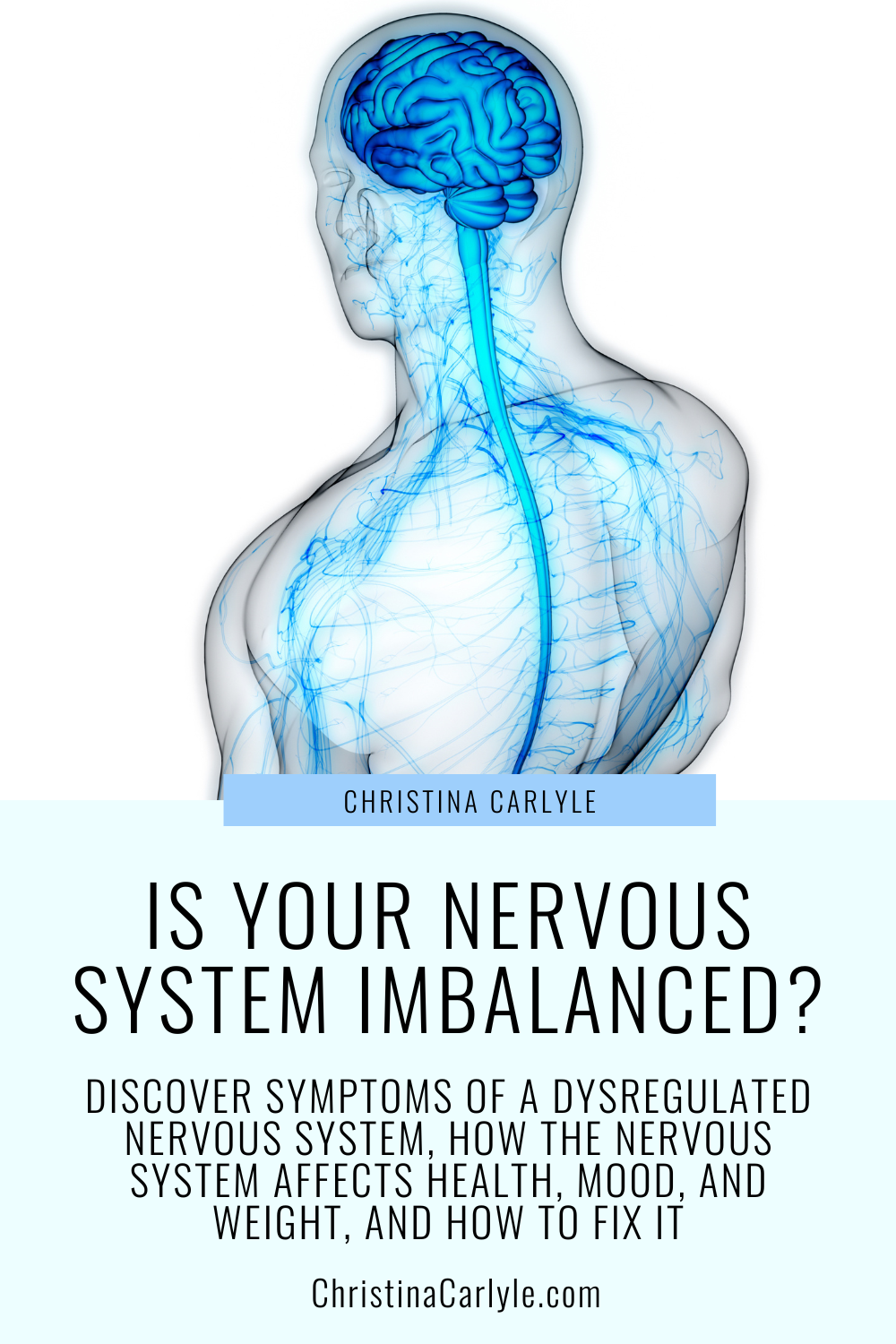
Pin this to Pinterest so you’ll have it forever

